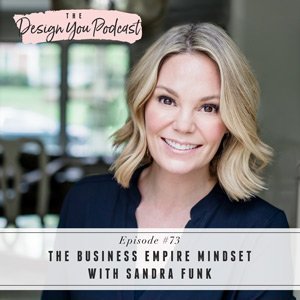
The excitement of summer has started to die down slowly, and it’s been a while since I’ve had a guest on the show. Today, I’ve got Sandra Funk on to talk about the ins and outs of building a successful design business. Whether you’re an interior designer or a creative in a different field, if you aspire to get to that top level of your industry, this episode is for you.
Sandra’s divulging what it really takes to build the life and business you want and how your mindset is key to get you there. She’s sharing why she has such an abundant mindset when it comes to the design industry and how she thinks it’ll benefit everyone to practice this type of mentality. We’re also covering everything from ideal clients or “whales,” to pricing structures and charging what your services are worth.
Join us this week to hear Sandra’s thoughts on business and mindset. We are such kindred spirits in so many ways, and I’m so excited for you to get such valuable insight from her to build the dream business you’ve always wanted.
If you want to keep this conversation going, you have to join my free Design You Podcast community on Facebook. We have great conversations over there about the podcast episodes and our podcast guests are in there too! So head on over and I’ll see you there!





